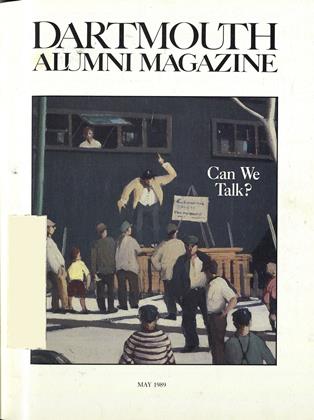Lots of classmates have made the news in a big way in recent months—with long articles in their local newspapers. A common theme running through these articles suggests that as a group, they are special-special in times of adversity and special in the way they look at the world
A major profile in the Minneapolis Star Tribune about John Penn, who several months ago became head of Benson Optical Cos., the nation's fourth largest eyeware chain, begins by describing his 1980 ouster as president of Arctic Enterprises, a job he had held for seven years.
"Few would have blamed him for being bitter." But instead, with people in the town of Thief River Falls worried about layoffs, Penn addressed the Chamber of Coir merce, urging people to rally behind the county, saying it would bounce back from its troubles without him.
"It was, friends say, a classic example of the way Penn has spent his career, as an executive with an uncommon concern for his coworkers. It's a reputation that has followed him to his latest job ..."
Or take Sam Bell, who was going to be speaker of the Florida house until voters in his home district abruptly ousted him. A sixpage article in Florida Magazine, the Sunday supplement of the Orlando Sentinel, documents numerous ways that Bell was special. "By any account, it's been an incredible 14 years, even for a legislator. Many of Bell's peers rank him among the best and brightest to have ever served in the Florida House of Representatives ...
"During a session, he convinced the House speaker to put him on every important committee in the House. The result was he had a critical say in almost piece of important legislation drafted that year..."
What kinds of legislation? He's Proudest of the child restraint law, passed in 1982. He also cites nursing home reform, health care for the elderly, an infant screening test for a condition that can lead to retardation if untreated, another that gets primary grade teachers to test for curvature of the spine.
Former house speaker Ralph Haben called Sam "probably the smartest man to ever walk those halls. Not just smart. But smart, tough and with total determination and commitment to get things done he wanted to get done ... I believe that history will record Sam Bell had more impact on the positive things in the Legislature this past decade than anyone in the state."
Or take Mike Gazzaniga, who has just started The Journal of Cognitive Neuroscience, because nobody was bringing together the study of the brain (structure, chemistry) with the study of the mind (how we think, learn, remember, perceive). Psychologists rarely read neurology journals and neurologists rarely read psychology journals, says Mike, who is now on the faculty at the Dartmouth Medical School.
New instruments, such as magnetic resonance imaging (MRI) and positron emission tomography (PET) are helping scientists understand brain structure ana function in ways not possible with X-rays. Meantime, studies are increasing of people with what Gazzaniga calls "broken brains"—Alzheimer's disease patients, people with strokes, epilepsy to see how those structural defects affect function. So his new journal will serve as a bridge, an uncommon link between physicians and psychologists. He's preparing to take yet another unusual step with the journal —to publish negative results that refute findings of others. "Because these papers have a hard time getting into the system .. . untruth cooks along .. . longer than it should."
Lastly, Terry Ortwein's play, Act Three,Scene Five was presented by the Dartmouth Players in the Warner Bentley Theatre on February 27, 28, and March 1. The play is about real people. Said the program notes: "It is only when real people drop the masks and listen to each other that they can know one another. Usually they end up liking each other a lot more than they did when they were pretending."
Office of Information and Publications, Bowman Gray School of Medicine, 300 S. Hawthorne Road, Winston-Salem, NC 27103
 View Full Issue
View Full Issue
More From This Issue
-
 Feature
FeatureWhen Dialogue Turns to Diatribe
May 1989 By Larry Martz '54 -
 Feature
FeatureDartmouth's Competitive Niche
May 1989 By Mahlon Apgar IV '62 -
 Feature
FeatureLet's Start a Genuine Discussion About Our College
May 1989 By George Munroe '43 -
 Feature
FeatureStudents in a "Goldfish Bowl" Rise to Debate
May 1989 By Ron Lepinskas '89 -
 Cover Story
Cover StoryCAN WE TALK?
May 1989 By Jay Heinrichs -
 Article
ArticleREVIEW LOSES SUIT
May 1989
Bob Conn
Class Notes
-
 Class Notes
Class Notes1883
May 1949 By ALFRED E. WATSON -
 Class Notes
Class Notes1940
December 1991 By Chet Berry -
 Class Notes
Class Notes1996
Jan/Feb 2013 By Garrett Gil de Rubio -
 Class Notes
Class Notes1955
DECEMBER 1996 By Leo Mattel -
 CLASS NOTES
CLASS NOTES1975
NOVEMBER | DECEMBER 2023 By Stephen D. Gray -
 Class Notes
Class Notes1923
SEPTEMBER 1994 By Wayne M. Derkac








